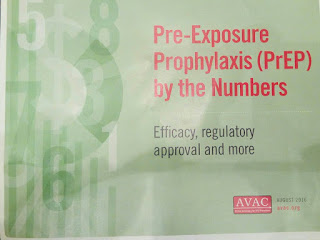In a bid to prevent new infections of HIV among most-at-risk populations such as sex workers in Nigeria, the country was selected to play host to a pre-exposure prophylaxis (PrEP) demonstration project among serodiscordant couples in select states. The project which is scheduled to run from late-2015 until late-2017 is currently ongoing but there have been challenges in accessing PrEP by many sex workers.
According to the Center for Disease Prevention and Control (CDC), PrEP is when people at very high risk for HIV take HIV medicines daily to lower their chances of getting infected. Oral PrEP contains the antiretroviral drugs tenofovir and emtricitabine and studies show that it can drastically reduce the risk of infection if used properly. The drug is taken prior sex with an HIV-infected person or to ensure safety during sex without condom even if the other partner is not living with HIV.
For sex workers in Nigeria, there have been several factors impeding their access to and uptake of PrEP and some of these factors are can be corrected if proper programming is done.
According to a UNAIDS report, 9 percent of all people living with HIV globally live in Nigeria and around 210,000 people died from AIDS-related illnesses in Nigeria in 2013, which is 14 percent of the global total of deaths (AVERT). And part of this could be as s result of inaccessibility to PrEP and other essential HIV prevention services.
This statistics puts Nigeria among the fore in the global map which the government to mention its inclusion in the 2014-15 National HIV Prevention Plan as one of the new prevention tools that should be explored in Nigeria to drastically drive down new infections of HIV. However, there is no national PrEP policy or guidance at present and it is hoped that the ongoing demonstration project may be used to inform such policy.
Amaka Enemo, Coordinator of the Nigerian Sex Workers Association of Nigeria who was recently appointed a 2016 AVAC fellow, while speaking at the HIV Research for Prevention (HIVR4P) meeting in Chicago, said that it is important for sex workers in Nigeria to access PrEP but sadly there has been poor access and lack of commitment by relevant bodies to make the drug available which has impeded intake by key populations. She however commended AVAC for ensuring that PrEP gets to everybody and that no one is left behind.
“Sex workers in Nigeria are at a high risk of contracting HIV and need to be able to take care of their health. And one way of doing so, is by accessing PrEP. Our work is hazardous because we face frequent bullying and rape. And we are calling on the Nigerian Health Authorities to ensure availability and that access to PrEP to be included in the national prevention guideline, so that our members and other key affected populations are not left behind.”
On his part, a research scholar, Gabriel Adeyemo said that PrEP is available in Nigeria but that a major challenge is that most people taking the drugs do not always remember the time of their medicine.
“We should not forget that due to the nature of the job of sex workers, they sometimes skip their medications and this can effect on the efficacy of the drugs thus exposing them to greater risks. There is also the absence of an enabling environment due to the stigma and discrimination they have to face when they try accessing the drugs. However, we can correct this if we embark on a program agenda that meaningfully involves the communities most impacted by HIV’, he said.
Scientists at the HIVR4P conference are hopeful that soon, there will be the introduction of long acting new PrEP tools such as new PrEP formulations to combine with long acting reversible contraceptives (LARCs). This will hopefully achieve the ambitious Target 90:90:90 which seeks to ensure that by 2020, 90% of all people living with HIV will know their HIV status, 90% of all people with diagnosed HIV infection will receive sustained antiretroviral therapy and that 90% of all people receiving antiretroviral therapy will have viral suppression.


No comments:
Post a Comment